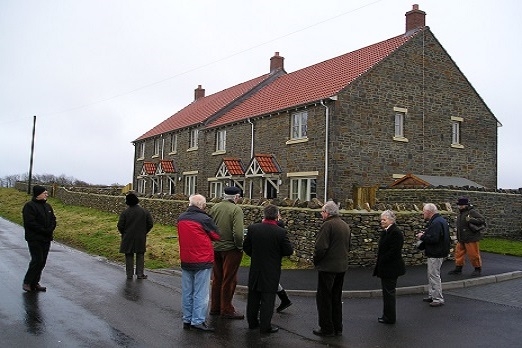Definitions - Affordable housing is defined as: housing for rent, shared ownership or outright purchase, provided at a cost (considered affordable, in relation to incomes that are average or below average, or in relation to the price of general market housing).
Affordable housing is provided to specific, eligible households, who cannot access the open market. Affordable housing should both remain affordable in perpetuity. In rural parishes, it should be restricted to those households with a strong local connection to that parish. In many cases, this is defined as people who were born in the area, still have family there and work locally.
Affordable housing is housing that will be available for people, whose income denies them the opportunity to purchase or rent houses which are generally available on the open market. This is as a result of the relationship between their income and housing costs. Affordable housing includes subsidised housing (reduced cost market housing and social rented housing).
CPRE Somerset’s Position
• There should be increased provision of affordable housing in rural communities.
• All proposals must demonstrate need and the housing must remain affordable in perpetuity.
• Affordable housing should be widespread throughout settlements and not in large groups.
• The need for affordable housing should not justify provision of “excess” market housing in order to achieve sufficient affordable homes through planning obligations. In this context, lower thresholds should be sought in villages and small towns where there is a requirement to provide an affordable housing component in residential development.
• Ideally, sites for affordable housing should be selected by a “sieving” process that identifies possible appropriate sites not just by considering “exception” sites put forward by village edge landowners.
• Land should be used efficiently. Higher housing densities should be aimed for consistent with good design. With careful attention to design and layout, attractive developments can be created at higher density.
• Current planning policy excludes many appropriate sites. Open country should be considered where appropriate – for instance as part of existing farmsteads. •Housing Associations should be encouraged to buy up cheaper existing houses and rent these out as affordable homes – provided tat this does not create a deficit in low-cost market housing.
• New development in villages and small towns should respect local character and distinctiveness and settlement pattern. In terms of design, this does not mean simply aping the past: there is a place for innovative designs which can still be “in keeping”.
• Development should be constructed to the highest standards of energy efficiency. Renewable energy installations should be encouraged so long as these are visually acceptable. In all significant developments, local authorities should require a proportion of energy supply to be provided from on-site renewable energy sources
In summary, CPRE Somerset recognises the need for affordable housing, particularly to provide a mix of accommodation so that rural communities remain alive and socially inclusive. But we must be careful that the need for affordable rural housing does not put unacceptable development pressure on the rural landscape and that measures put in place to protect the environment are not disregarded. We would like to see more innovation in the development of affordable housing, dotting it throughout the community and consisting of a variety of house sizes, types, character and location – including renovated properties, not just new clusters of tiny, identical houses.


